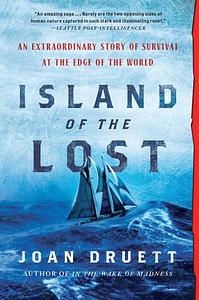You need to sign in or sign up before continuing.
Take a photo of a barcode or cover
adventurous
dark
hopeful
inspiring
sad
tense
medium-paced
A harrowing story but useful to consider in difficult times—these poor people had such a hard time.
adventurous
informative
medium-paced
read at work. a good interesting read, especially all the details about the everyday workings of the sealing trade that I never knew about. The narrative was pretty exciting, though I do wish the second ship's side had more information. Can't help historical documentation though.
....TRULY that man was a jack-of-all-trades though. insane. can hardly believe he really built a FORGE and a BOAT
....TRULY that man was a jack-of-all-trades though. insane. can hardly believe he really built a FORGE and a BOAT
adventurous
emotional
slow-paced
adventurous
challenging
informative
tense
slow-paced
adventurous
dark
informative
medium-paced
Really enjoyed this true shipwreck story. Not at all dissimilar to the Endurance story except that there are two shipwrecks in this book. The two shipwrecks have very different outcomes. Great for anyone interested in survival or seafaring. It also serves as an important lesson in the importance of good leadership in the face of adversity.
I love stories of nautical disaster, particularly in polar regions. While the misfortunes described by Druett in Island of the Lost do not qualify as "polar" (no icebergs, no overwintering in the ice, no polar bears) the miserable sub-Antarctic conditions heighten the drama nonetheless.
The question implicit in the packaging of these two stories of survival is--why did the party from one shipwreck survive and escape by their own devices while the other party almost entirely died out before they were rescued, having been shipwrecked a much shorter time than the first party? The author seems to invite the reader to conclude that the members the Grafton crew all survived due to the leadership and ingenuity of the two ranking officers while the failure of the Invercauld's crew to survive was because the officers saw their roles as bosses rather than leaders. However, the circumstances under which each group found itself were quite different and there was no small amount of luck involved in their very different outcomes. For instance, much of the Grafton was salvageable and provided its crew materials they used to survive and, eventually, to escape. The Invercauld was almost a complete loss. Furthermore, the Grafton crew found seasonally abundant food (sea lions) while the part of the island where the Invercauld wrecked had no seal rookeries at that time. The Invercauld party also started out much larger than the Grafton party (19 as opposed to 5) so scant foodstuffs went further in keeping the latter from starvation. But I do admit that, luck aside, courage and leadership are important in this sort of situation and probably did play a part in determining the eventual outcomes.
The author of this book seems to have drawn heavily from the accounts published by the individuals from each crew who were most instrumental in finding ways for their groups to survive... and I think these accounts should be taken with a grain of salt. We all would rather think of ourselves as more heroic than we actually are. I do find that most of these survival stories have some indefatigable problem-solving character (usually the captain, in the case of the Invercauld, an undistinguished seaman who published his memoir several decades after the fact)--and I suppose there are a few reasons this might be. First, the captain will be the most likely person to keep a complete account of happenings and he will naturally burnish his own deeds and character. Second, the captain (or the mate), being in a position of command, either actually has the character or feels compelled to rise to the occasion under the direst of circumstances. Finally, the literature is likely heavily biased toward this narrative because disasters without such individuals tend to fail and these groups are never heard from again.
Anyway, in spite of the lack of polar bears (or even the somewhat more likely penguins) Island of the Lost was an incredible story.
The question implicit in the packaging of these two stories of survival is--why did the party from one shipwreck survive and escape by their own devices while the other party almost entirely died out before they were rescued, having been shipwrecked a much shorter time than the first party? The author seems to invite the reader to conclude that the members the Grafton crew all survived due to the leadership and ingenuity of the two ranking officers while the failure of the Invercauld's crew to survive was because the officers saw their roles as bosses rather than leaders. However, the circumstances under which each group found itself were quite different and there was no small amount of luck involved in their very different outcomes. For instance, much of the Grafton was salvageable and provided its crew materials they used to survive and, eventually, to escape. The Invercauld was almost a complete loss. Furthermore, the Grafton crew found seasonally abundant food (sea lions) while the part of the island where the Invercauld wrecked had no seal rookeries at that time. The Invercauld party also started out much larger than the Grafton party (19 as opposed to 5) so scant foodstuffs went further in keeping the latter from starvation. But I do admit that, luck aside, courage and leadership are important in this sort of situation and probably did play a part in determining the eventual outcomes.
The author of this book seems to have drawn heavily from the accounts published by the individuals from each crew who were most instrumental in finding ways for their groups to survive... and I think these accounts should be taken with a grain of salt. We all would rather think of ourselves as more heroic than we actually are. I do find that most of these survival stories have some indefatigable problem-solving character (usually the captain, in the case of the Invercauld, an undistinguished seaman who published his memoir several decades after the fact)--and I suppose there are a few reasons this might be. First, the captain will be the most likely person to keep a complete account of happenings and he will naturally burnish his own deeds and character. Second, the captain (or the mate), being in a position of command, either actually has the character or feels compelled to rise to the occasion under the direst of circumstances. Finally, the literature is likely heavily biased toward this narrative because disasters without such individuals tend to fail and these groups are never heard from again.
Anyway, in spite of the lack of polar bears (or even the somewhat more likely penguins) Island of the Lost was an incredible story.
adventurous
informative
reflective
medium-paced
informative
slow-paced




